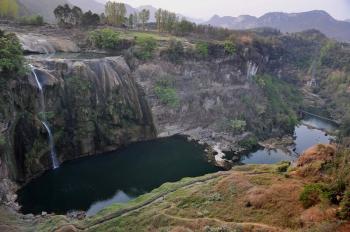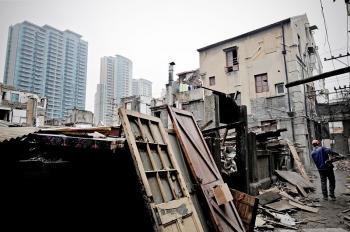2006 marks the 40th anniversary of the Cultural Revolution. The Chinese authorities demanded a low-profile response to it, forbidding the newspapers to publish any article to memorize or to reflect on the political movement. In addition, all information relevant to the Cultural Revolution has been filtered out from Internet search engines. The Chinese Communist Party (CCP) refuses to reflect on the historical event and even attempted to erase this bloodstained period of Chinese history.
The public, however, whether they are retired officials, intellectuals, or the numerous victims, find it hard to forget the tragedy. They appeal the Chinese authorities to squarely face the history and to reflect on the havoc that has brought the grave disaster for the Chinese people and the whole country.
Lao She: the First Writer to be Persecuted to Death During the Cultural Revolution
On May 16, 1966, the CCP issued the well-known “May 16 Notice,” to launch the Great Proletarian Cultural Revolution in all parts of China. On the eve of the 40th anniversary of the Cultural Revolution, Shu Ji, the daughter of the famous Chinese writer Lao She, said, when interviewed by the Hong Kong-based Apple Daily , that the Cultural Revolution is part of the Chinese history and the Chinese communist regime should reexamine that period of history. Lao She had revealed no intention of committing suicide, and his last words were spoken to his five-year-old granddaughter at a very slow speed, “Bid farewell to Grandpa,” Shu Ji was quoted as saying.
On August 23, 1966, the Red Guards in Beijng picked up over 20 famous writers and took them to public criticism[1] outside the Confucius Temple in Beijing. The Red Guards beat all the writers in front of the blazing fire that was burning all kinds of literature and cultural heritages. On August 24, Lao She committed suicide by drowning himself in the Taiping Lake in Beijing. Based on the information from the Beijing literature Association website, Lao She was said to be the first well-known writer persecuted to death during the Cultural Revolution.
Song Yongyi: It is Not Only Mao Zedong Who Launched the Cultural Revolution
When interviewed by Radio Free Asia, Mr. Song Yongyi, an expert in the history of the Cultural Revolution and a current resident in the United States, stated that apart from Mao Zedong and Red Guards, the CCP central committee itself was also involved in launching the Cultural Revolution.
Song Yongyi said, “It is after the Eighth Plenary Session of the Tenth Central Committee that Liu Shaoqi stepped down his leading position in the Chinese communist regime. That is to say, Mao Zedong was demoted after putting up big-character posters [2] named ”Bombard the Headquarters” on August 5. Mao was no longer in charge of the Cultural Revolution. From the beginning of May to the end of July in 1966, the high-ranking officials in the central committee headed by Liu Shaoqi had signed a dozen of documents which were spread around the country and referred to as guidance to carry out the nationwide Cultural Revolution.
It was these documents signed by the central committee that first listed the names of the famous writers. At that time about over 100 names of the writers appeared on the list, excluding Lao She. Yet, it was the high-ranking officials in the central committee headed by Liu Shaoqi, Deng Xiaoping and Zhou Enlai that directed the target toward the literary greats in their attempt to carry out the “May 16 Notice.”
Zheng Yi: People Ate People in Guangxi
Scholars hold that humanity and human personalities were distorted and devastated during the Cultural Revolution, during which relatives or friends testified to the wrongdoing of one another, tortured or even revengefully killed one another. The massacre occurred in Guangxi Province in 1968 and the tragedy in which “people ate people” were definite evidence for the philosophy of struggle sessions and the theory of slaughter held to be true and carried out by the CCP.
Based on the historic materials compiled by the Chinese authorities, such as “Events of the Cultural Revolution in Nanning District” and “Events of the Cultural Revolution in Guangxi Province,” during the summer months from April to August in 1968, cannibalism took place in Guangxi. Over 100 people in Wuxuan County in Guangxi were eaten, while almost 4,000 people were victimized in Binyang County.
Zheng Yi, a renowned writer in China, went to the scenes in 1986 and 1988 respectively to collect evidence for the tragic happening and recorded the terrifying history in Scarlet Memorial. “Those who were eaten were the definite objects of revengeful actions because of the hatred against the bourgeoisie incited by the Cultural Revolution. Those who were eaten were all landlords, rich peasants, anti-revolutionaries, bad elements and rightists, and their children,” Zheng Yi was quoted as saying in her recent interview by RFA.
Liu Guokai, an expert on the Cultural Revolution, points out that the people labeled as the “black five classes” and their family members suffered the most during the Cultural Revolution. In order to suppress anyone who might not swear allegiance to it, the CCP always punished these landlords and rich peasants first as a warning to others. These “black five classes” became victims of the class struggle initiated by the CCP.
Zheng Yi regards it as an extreme expression of class hatred, class struggle and proletarian dictatorship incited by Mao Zedong. Zheng Yi says, “The CCP preaches its theory of suppression of class enemies by resorting to every conceivable means. When dealing with a class enemy, you cannot just vent your hatred and prove your firm position through criticism and struggle. You must beat the class enemy to death, but it is still not enough to declare your stand clearly. What should you do then? In the end you have to kill him. This is the only way to express your hatred for the class enemy and make know your position.
People’s Political Consultative Conference Members Propose Building a Cultural Revolution Museum
In March a joint proposal by 48 Chinese People’s Political Consultative Conference (CPPCC) members was submitted seeking the establishment of a “Great Cultural Revolution Museum” in order to rethink this painful period of history and reflecting the Chinese peoples’ appeal for CCP officials to squarely face the Party’s history.
The proposal handed over by Yang Kuangman , CPPCC member and China Writers’ Association member, was also signed by others including He Jiesheng, the eldest daughter of Marshal He Long who was persecuted to death during the Cultural Revolution, Tao Siliang, the daughter of the former deputy premier of State Council Tao Zhu, Shu Yi, the son of renowned writer and novelist Lao She, Wang Anyi, Zhang Kangkang, the former vice director of the Lu Xun Museum Chen Shuyu, and other famous writers.
He Jiesheng said that the establishment of the Cultural Revolution museum is the last wish of the former chairman of the Chinese Writers’ Association, Ba Jin. The aim is to look history squarely in the face and help young people understand the catastrophe of China’s past so as to avoid a repetition of events.
The CCP Bans Commemoration of the Cultural Revolution
However, up to now, the Cultural Revolution in China is still a taboo subject. In the U.S., University of Chicago scholar Ms. Wang Youqin built a memorial website for families of the victims of the Cultural Revolution to register and commemorate their loss. (http://humanities.uchicago.edu/faculty/ywang/history/). The website was open less than a year before being blocked by Beijing authorities in March 2002. And the book “Scarlet Memorial” by Zheng Yi has been black-listed in mainland China.
The CCP has not looked in upon itself over this national catastrophe. Instead of reflecting upon its past conducts and learning the lessons, it later launched the June 4 Tiananmen Square Massacre and the suppression and persecution of Falun Gong.
In March, the Minister of Culture Sun Jiazheng declared that there would be no official activities related to the 40th anniversary of the Cultural Revolution. The Chinese Ministry of Propaganda, responsible ultimately for media content, will not ratify for publication any books on the Cultural Revolution and will not arrange for broadcast any film and television productions on the Cultural Revolution.
China Photographers Association member Li Xiaobin planned originally to hold a small-scale photography exhibition on the Cultural Revolution in Beijing at the end of March. On the eve of the exhibition, Beijing police force informed him that the exhibition was “inconsistence with the Central Committee’s instructions” and hoped that Li could “put the interests of the whole above everything else.” In the end the exhibition was cancelled.
It has been reported that last year China’s media had few articles of reflection on the Cultural Revolution. The CCP actually set the agenda by ordering that reports and activities related to the Cultural Revolution be put on ice and, to divert attentions, the focus for everyone should be on supporting events reflecting the 85th anniversary of the founding of the Party and the 75th anniversary of the Red Army’s Long March.
Notes: [1]: A mass meeting where the victim is shouted at, insulted and often beaten by dozens of people until he finally confessed his supposed crime.
[2]: Large-character posters that were widely used during the Cultural Revolution to criticize, known as “dazibao” in Chinese.



